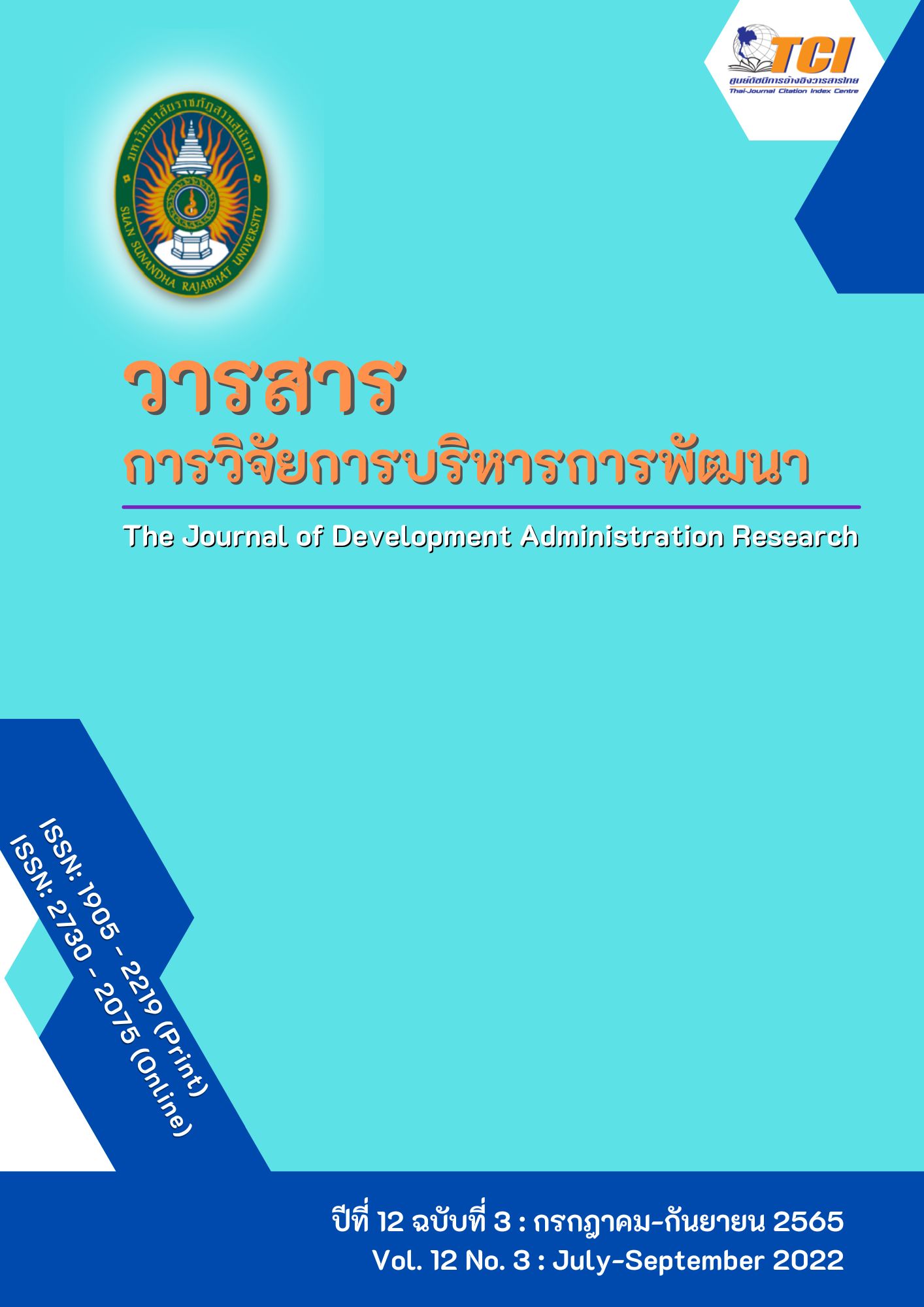ปัจจัยเชิงสาเหตุของสมรรถนะจัดการโครงการที่ส่งผลต่อผลลัพธ์ทางธุรกิจในภาคก่อสร้าง
คำสำคัญ:
การเร่งรัดโครงการ, การปรับเปลี่ยนตารางโครงการ, วิธีการจัดการโครงการ, สมรรถนะจัดการโครงการ, ผลลัพธ์ทางธุรกิจคุณภาพการให้บริการ, สำนักงานที่ดินบทคัดย่อ
บทความนี้มีวัตถุประสงค์สำคัญ คือ 1) เพื่อศึกษาปัจจัยเชิงสาเหตุที่ส่งผลต่อสมรรถนะจัดการโครงการและผลลัพธ์ทางธุรกิจในภาคก่อสร้าง 2) เพื่อศึกษาอิทธิพลของปัจจัยเชิงสาเหตุของสมรรถนะจัดการโครงการที่ส่งผลต่อผลลัพธ์ทางธุรกิจในภาคก่อสร้าง, และ 3) เพื่อสร้างแบบจำลองของปัจจัยเชิงสาเหตุของสมรรถนะจัดการโครงการที่ส่งผลต่อผลลัพธ์ทางธุรกิจในภาคก่อสร้าง ระเบียบวิธีการวิจัยครั้งนี้เป็นแบบผสมผสานระหว่างการวิจัยเชิงคุณภาพและเชิงปริมาณ โดยกลุ่มผู้ให้ข้อมูลเชิงคุณภาพ คือ ผู้จัดการหรือตัวแทนที่มีหน้าที่รับผิดชอบจัดการโครงการของธุรกิจก่อสร้าง โดยจำแนกกลุ่มผู้ให้ข้อมูลตามประเภทงานก่อสร้าง จำนวน
4 ราย ส่วนกลุ่มตัวอย่างเชิงปริมาณ คือ ผู้จัดการหรือตัวแทนที่จัดการโครงการของธุรกิจก่อสร้าง โดยการเก็บกลุ่มตัวอย่าง จำนวน 420 ราย เครื่องมือที่ใช้เก็บรวบรวมข้อมูล ได้แก่ แบบสัมภาษณ์และแบบสอบถามออนไลน์ สถิติที่ใช้ในการวิเคราะห์ข้อมูล ได้แก่ สถิติเชิงพรรณนาและสถิติเชิงอนุมาน
ผลการวิจัยพบว่า 1) ปัจจัยเชิงสาเหตุที่ส่งผลต่อสมรรถนะจัดการโครงการและผลลัพธ์ทางธุรกิจ
ในภาคก่อสร้าง ได้แก่ด้านการเร่งรัดโครงการ, ด้านการปรับเปลี่ยนตารางโครงการ และ ด้านวิธีการจัดการโครงการ 2) ปัจจัยเชิงสาเหตุของสมรรถนะการจัดการที่มีอิทธิพลต่อผลลัพธ์ทางธุรกิจในภาคก่อสร้างได้แก่ ด้านการเร่งรัดโครงการ, การปรับเปลี่ยนตารางโครงการ และ วิธีการจัดการโครงการ เช่นเดียวกัน และ
3) การสร้างแบบจำลองที่ส่งผลต่อผลลัพธ์ทางธุรกิจ ดังนั้น ผู้ประกอบการธุรกิจการก่อสร้างและวิศวกรรมก่อสร้าง ควรใช้หลักการสำคัญทั้ง 3 ด้าน มาเป็นแนวทางประกอบการสร้างแบบจำลองปัจจัยเชิงสาเหตุของสมรรถนะการจัดการโครงการเพื่อนำไปสู่การพัฒนานวัตกรรมด้านการจัดการโครงการให้ก้าวหน้า เพิ่มความถูกต้อง แม่นยำในการจัดการโครงการ และเพื่อสร้างความได้เปรียบทางการแข่งขันให้กับธุรกิจการก่อสร้างและวิศวกรรมก่อสร้างได้
เอกสารอ้างอิง
กิตติศักดิ์ เรืองศรี และศุภรัชชัย วรรัตน์ (2563). การวิเคราะห์ปัญหาในการดำเนินการจัดการบริหารโครงการ กรณีศึกษา. งานก่อสร้างอาคารศูนย์การเรียนรู้และพัฒนาการท่องเทียว จ.ชัยนาท. ค้นเมื่อ 2 มกราคม 2565, จาก https://grad.dpu.ac.th/upload/content/files/Year8-3/8358.pdf
บริษัท ไชยเจริญเทค จำกัด (2564). การก่อสร้าง ความหมาย ประเภท และการแบ่งงานก่อสร้าง.สมุทรปราการ: ไชยเจริญเทค.
Ávila-Cabrera, J. and Esteban, A. C. (2021). The project SubESP SKills: Subtitling tasks for students of business english to improve written production skills. English for Specific Purposes, 63, 33-44.
Bernroider, E. W. N., Wong, C. W. Y., and Lai, K. H. (2014). From dynamic capabilities to ERP enabled business improvements: The mediating effect of the implementation project. International Journal of Project Management, 32(2), 350-362.
Bon-Gang, H. (2018). Performance and improvement of green construction projects: Management Strategies and Innovations. Butterworth-Heinemann: Elsevier Science.
Burgelman, J. and Vanhoucke, M. (2020). Project schedule performance under general mode implementation disruptions. European Journal of Operational Research, 280(1), 295-311.
Deckrp, R.F. and Hebert, J. (1989). Resource Constrained Project Crashing. Omega, 17(1), 69-79.
Engelbrecht, J., Johnston, K. A., and Hooper, V. (2017). The influence of business managers' IT competence on IT project success. International Journal of Project Management, 35(6), 994-1005.
Gueymard, C. A. (2014). A review of validation methodologies and statistical performance indicators for modeled solar radiation data: towards a better bankability of solar projects. Renewable and Sustainable Energy Reviews, 39, 1024-1034.
Hair, J., Black, W., Babin, B., Anderson, R., & Tatham, R. (2006). Multivariate Data Analysis (6th ed.). Upper Saddle River, NJ: Pearson Prentice Hall.
Kanda, A. and Rao, U. R. K. (1984). A network flow procedure for project crashing with penalty nodes. European Journal of Operational Research, 16(2), 174-182.
Kang, C. and Choi, B.C. (2015). An adaptive crashing policy for stochastic time-cost tradeoff problems. Computers & Operations Research, 63, 1-6.
Ko, D. G. and Kirsch, L. J. (2017). The hybrid IT project manager: one foot each in the IT and business domains. International Journal of Project Management, 35(3), 307-319.
Li, Y., Cui, Z., Shen, H., and Zhang, L. (2021). Target-based project crashing problem by adaptive distributionally robust optimization. Computers & Industrial Engineering, 157, 107160.
Lyer, K. C. and Banerje, P. S. (2016). Measuring and benchmarking managerial efficiency of project execution schedule performance. International Journal of Project Management, 34(2), 219-236.
Moschetti, R., Brattebø, H., Skeie, K. S., and Lien, A. G. (2018). Performing quantitative analyses towards sustainable business models in building energy renovation projects: Analytic process and case study. Journal of Cleaner Production, 199, 1092-1106.
Murali, K. M. and Rao, T. A. (1998). Epitomising the structure of a project network for crashing by identifying non-requisite activities. IFAC Proceedings Volumes, 31(15), 857-863.
Nguyen, N. M., Killen, C., Kock, A., and Gemünden, H. G. (2018). The use of effectuation in projects: the influence of business case control, portfolio monitoring intensity and project innovativeness. International Journal of Project Management, 36(8),1054-1067.
Olanipekun, A. O., Xia, B., and Nguyen, H. T. (2017). Motivation and owner commitment for improving the delivery performance of green building projects: a research framework. Procedia Engineering, 180,71-81.
Petro, Y. and Gardiner, P. (2015). An investigation of the influence of organizational design on project portfolio success, effectiveness and business efficiency for project-based organizations. International Journal of Project Management, 33(8), 1-13.
Serra, C. E. M. and Kunc, M. (2015). Benefits realisation management and its influence on project success and on the execution of business strategies. International Journal of Project Management, 33, 53-66.
Sung, I., Choi, B., and Neilsen, P. (2020). Reinforcement learning for resource constrained project scheduling problem with activity iterations and crashing. IFAC PapersOnLine, 53(2), 10493-10497.
Takagi, N. and Varajão, J. (2019). Integration of success management into project management guides and methodologies - position paper. Procedia Computer Science, 164, 366–372.
Vrat, P. and Kriengkrairut, C. (1986). A goal programming model for project crashing with piecewise linear time-cost trade-off. Engineering Costs and Production Economics, 10(1), 161-172.
Wang, E. et al. (2017). The uncertainty of crop yield projections is reduced by improved temperature response functions. Nature Plants, 3(8),17102.
Yenyuak, C. (2021). Project Management. Pathumthani:Teaching Publications.
ดาวน์โหลด
เผยแพร่แล้ว
รูปแบบการอ้างอิง
ฉบับ
ประเภทบทความ
สัญญาอนุญาต
ลิขสิทธิ์ (c) 2022 วารสารการวิจัยการบริหารการพัฒนา

อนุญาตภายใต้เงื่อนไข Creative Commons Attribution-NonCommercial-NoDerivatives 4.0 International License.
บทความที่ได้รับการตีพิมพ์เป็นลิขสิทธิ์ของมหาวิทยาลัยราชภัฏสวนสุนันทา
ข้อความที่ปรากฏในบทความแต่ละเรื่องในวารสารวิชาการเล่มนี้เป็นความคิดเห็นส่วนตัวของผู้เขียนแต่ละท่านไม่เกี่ยวข้องกับมหาวิทยาลัยราชภัฏสวนสุนันทา และคณาจารย์ท่านอื่นๆ ในมหาวิทยาลัยฯ แต่อย่างใด ความรับผิดชอบองค์ประกอบทั้งหมดของบทความแต่ละเรื่องเป็นของผู้เขียนแต่ละท่าน หากมีความผิดพลาดใดๆ ผู้เขียนแต่ละท่านจะรับผิดชอบบทความของตนเองแต่ผู้เดียว




